academica of cicero. - 912 Freedom Library
academica of cicero. - 912 Freedom Library
academica of cicero. - 912 Freedom Library
You also want an ePaper? Increase the reach of your titles
YUMPU automatically turns print PDFs into web optimized ePapers that Google loves.
The Project Gutenberg eBook <strong>of</strong> ...<br />
the suggestion <strong>of</strong> a friend that Lucullus is nom. and that quos legisset = quorum commentarios<br />
legisset I think improbable. Hodie: Drakenborch on Livy V. 27 wants to read hodieque, which<br />
however, is not Ciceronian. In passages like De Or. I. 103 and Verr. V. 64, the que connects<br />
clauses and does not modify hodie. On this subject see Madv. Opuscula I. 390. Etsi: M.D.F. V.<br />
68, shows that in Cic. a parenthetic clause with etsi always has a common verb with its principal<br />
clause; a rule not observed by the silver writers. The same holds <strong>of</strong> quamquam, see n. on I. 5.<br />
Calumnia: properly a fraudulent use <strong>of</strong> litigation, s???fa?t?a. The chief enemy was the infamous<br />
Memmius who prosecuted him. In urbem: until his triumph Luc. would remain outside the city.<br />
Pr<strong>of</strong>uisset: this ought properly to be pr<strong>of</strong>uerit, but the conditional dicerem changes it. Potius ...<br />
quam ... communicem: n. on 23.<br />
§4. Sunt ... celebrata: cf. I. 11, 17 for the collocation <strong>of</strong> the words. Externa ... interiora: cf. De<br />
Div. II. 124 sed haec quoque in promptu, nunc interiora videamus. Pro quaestore: for this Faber<br />
wrote quaestor, arguing that as Luc. was Sulla's quaestor and Sulla sent him to Egypt, he could<br />
not be pro quaestor. But surely after the first year he would be pro quaestor. Dav. reads quaestor<br />
here and 11, saying "veterem lectionem iugulavit Faber". Ea memoria ... quam: Bentl., Halm,<br />
Baiter give qua, Halm refers to Bentl. on Hor. Sat. I. 6, 15. A passage like ours is D.F. I. 29, ista<br />
sis aequitate, quam ostendis, where one MS. has qua. Read Madvig's lucid note there. De quibus<br />
audiebat: Madv. Em. 121 makes this equivalent to de eis rebus de quibus, the necessity <strong>of</strong> which<br />
explanation, though approved by Halm, I fail to see. The form <strong>of</strong> expression is very common in<br />
Cic., and the relative always refers to an actually expressed antecedent, cf. e.g. Cat. Mai. 83. I<br />
take quibus as simply = libris.<br />
§5. Ac: strong, as <strong>of</strong>ten, = ?a? µ??. Personarum: public characters, p??s?p?? p??e?? (Ad. Fam.<br />
XV. 17, 2), so personas 6. Multi ... plures: cf. Introd. p. 30. Reliqui: many MSS. insert qui by<br />
dittographia, as I think, though Halm, as well as Bait., retains it. On the retention or omission <strong>of</strong><br />
this qui will depend the choice <strong>of</strong> putant or putent below. Earum rerum disputationem: for disp.<br />
followed by genitive see n. on I. 33. Non ita decoram: for this feeling see Introd. p. 30. For non<br />
ita cf. the Lowland Scottish "no just sae". Historiae loquantur: hist. means in Cic. rather<br />
"memoirs" than "history," which is better expressed by res gestae. Note that the verb loqui not<br />
dicere is used, and cf. n. on 101. Legatione: to the kings in Egypt and the East in alliance with<br />
Rome. The censorship was in 199 B.C. About the embassy see Dict. Biogr. art. 'Panactius'.<br />
Auctorem: one would think this simple and sound enough, Bentl. however read fautorem, Dav.<br />
auditorem.<br />
§6. Illigari: "entangled" as though in something bad. For this use Forc. qu. Liv. XXXIII. 21, Tac.<br />
Ann. XIII. 40. Aut ludicros sermones: = aut clar. vir. serm. ludic. esse oporteat. Rerum leviorum:<br />
a similar argument in D.F. I. 12. Quodam in libro: the Hortensius. Gradu: so the word "degree"<br />
was once used, e.g. "a squire <strong>of</strong> low degree" in the ballad. De opera publica detrahamus: the<br />
dative <strong>of</strong>ten follows this verb, as in D.F. III. 7 nihil operae reipublicae detrahens, a passage <strong>of</strong>ten<br />
wrongly taken. Operae is the dat. after the verb, not the gen. after nihil, reip. the gen. after<br />
operae, like opera publica here, not the dat. after detrahens. Nisi forensem: the early oratorical<br />
works may fairly be said to have this character; scarcely, however, the De Republica or the De<br />
Leg. both <strong>of</strong> which fall within the period spoken <strong>of</strong>. Ut plurimis prosimus: cf. Introd. p. 29. Non<br />
modo non minui, sed: notice non modo ... sed thrice over in two sentences.<br />
§7. Sunt ... qui negent: and truly, see Introd. p. 38. In Cat. Mai. §3 Cic. actually apologises for<br />
making Cato more learned than he really was. Mortuis: Catulus died in 60, Lucullus about 57,<br />
Hortensius 50. Contra omnis dicere quae videntur: MSS. mostly insert qui between dicere and<br />
quae, one <strong>of</strong> the best however has dicere quae aliis as a correction, while another has the<br />
marginal reading qui scire sibi videntur. The omission <strong>of</strong> qui, which I conjectured, but now see<br />
occurs in a MS. (Pal. 2) referred to by Halm, gives admirable sense. Verum invenire: cf. 60.<br />
Contentione: = f????e???a as usual. In ... rebus obscuritas: cf. I. 44 rerum obscuritate.<br />
Infirmitas: cf. I. 44 imbecillos animos. Antiquissimi et doctissimi: on the other hand recentissima<br />
quaeque sunt correcta et emendata maxime I. 13. Diffisi: one <strong>of</strong> the best MSS. has diffissi, which<br />
http://www.gutenberg.org/files/14970/14970-h/14970-h.htm[1/5/2010 10:31:57 AM]















